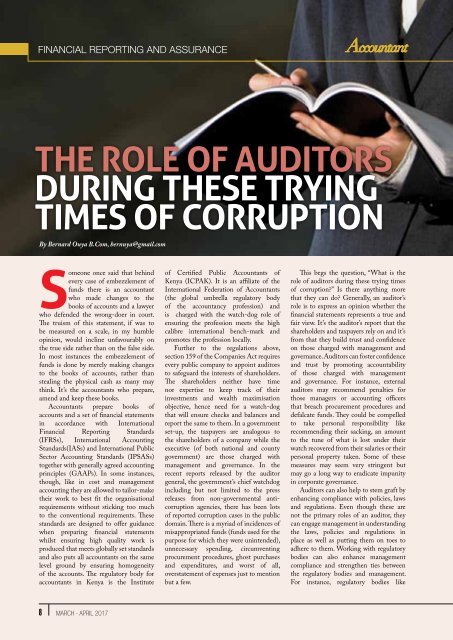The Accountant-Mar-April 2017
Create successful ePaper yourself
Turn your PDF publications into a flip-book with our unique Google optimized e-Paper software.
Financial reporting and assurance<br />
THE ROLE OF AUDITORS<br />
DURING THESE TRYING<br />
TIMES OF CORRUPTION<br />
By Bernard Ouya B.Com, bernuya@gmail.com<br />
Someone once said that behind<br />
every case of embezzlement of<br />
funds there is an accountant<br />
who made changes to the<br />
books of accounts and a lawyer<br />
who defended the wrong-doer in court.<br />
<strong>The</strong> truism of this statement, if was to<br />
be measured on a scale, in my humble<br />
opinion, would incline unfavourably on<br />
the true side rather than on the false side.<br />
In most instances the embezzlement of<br />
funds is done by merely making changes<br />
to the books of accounts, rather than<br />
stealing the physical cash as many may<br />
think. It’s the accountants who prepare,<br />
amend and keep these books.<br />
<strong>Accountant</strong>s prepare books of<br />
accounts and a set of financial statements<br />
in accordance with International<br />
Financial Reporting Standards<br />
(IFRSs), International Accounting<br />
Standards(IASs) and International Public<br />
Sector Accounting Standards (IPSASs)<br />
together with generally agreed accounting<br />
principles (GAAPs). In some instances,<br />
though, like in cost and management<br />
accounting they are allowed to tailor-make<br />
their work to best fit the organisational<br />
requirements without sticking too much<br />
to the conventional requirements. <strong>The</strong>se<br />
standards are designed to offer guidance<br />
when preparing financial statements<br />
whilst ensuring high quality work is<br />
produced that meets globally set standards<br />
and also puts all accountants on the same<br />
level ground by ensuring homogeneity<br />
of the accounts. <strong>The</strong> regulatory body for<br />
accountants in Kenya is the Institute<br />
of Certified Public <strong>Accountant</strong>s of<br />
Kenya (ICPAK). It is an affiliate of the<br />
International Federation of <strong>Accountant</strong>s<br />
(the global umbrella regulatory body<br />
of the accountancy profession) and<br />
is charged with the watch-dog role of<br />
ensuring the profession meets the high<br />
calibre international bench-mark and<br />
promotes the profession locally.<br />
Further to the regulations above,<br />
section 159 of the Companies Act requires<br />
every public company to appoint auditors<br />
to safeguard the interests of shareholders.<br />
<strong>The</strong> shareholders neither have time<br />
nor expertise to keep track of their<br />
investments and wealth maximisation<br />
objective, hence need for a watch-dog<br />
that will ensure checks and balances and<br />
report the same to them. In a government<br />
set-up, the taxpayers are analogous to<br />
the shareholders of a company while the<br />
executive (of both national and county<br />
government) are those charged with<br />
management and governance. In the<br />
recent reports released by the auditor<br />
general, the government’s chief watchdog<br />
including but not limited to the press<br />
releases from non-governmental anticorruption<br />
agencies, there has been lots<br />
of reported corruption cases in the public<br />
domain. <strong>The</strong>re is a myriad of incidences of<br />
misappropriated funds (funds used for the<br />
purpose for which they were unintended),<br />
unnecessary spending, circumventing<br />
procurement procedures, ghost purchases<br />
and expenditures, and worst of all,<br />
overstatement of expenses just to mention<br />
but a few.<br />
This begs the question, “What is the<br />
role of auditors during these trying times<br />
of corruption?” Is there anything more<br />
that they can do? Generally, an auditor’s<br />
role is to express an opinion whether the<br />
financial statements represents a true and<br />
fair view. It’s the auditor’s report that the<br />
shareholders and taxpayers rely on and it’s<br />
from that they build trust and confidence<br />
on those charged with management and<br />
governance. Auditors can foster confidence<br />
and trust by promoting accountability<br />
of those charged with management<br />
and governance. For instance, external<br />
auditors may recommend penalties for<br />
those managers or accounting officers<br />
that breach procurement procedures and<br />
defalcate funds. <strong>The</strong>y could be compelled<br />
to take personal responsibility like<br />
recommending their sacking, an amount<br />
to the tune of what is lost under their<br />
watch recovered from their salaries or their<br />
personal property taken. Some of these<br />
measures may seem very stringent but<br />
may go a long way to eradicate impunity<br />
in corporate governance.<br />
Auditors can also help to stem graft by<br />
enhancing compliance with policies, laws<br />
and regulations. Even though these are<br />
not the primary roles of an auditor, they<br />
can engage management in understanding<br />
the laws, policies and regulations in<br />
place as well as putting them on toes to<br />
adhere to them. Working with regulatory<br />
bodies can also enhance management<br />
compliance and strengthen ties between<br />
the regulatory bodies and management.<br />
For instance, regulatory bodies like<br />
8 MARCH - ApRIL <strong>2017</strong>

















